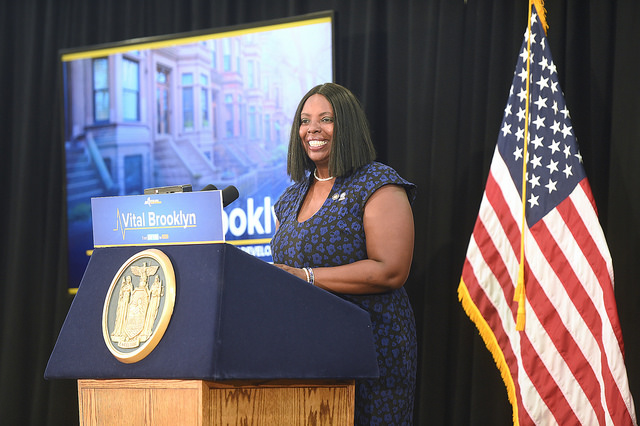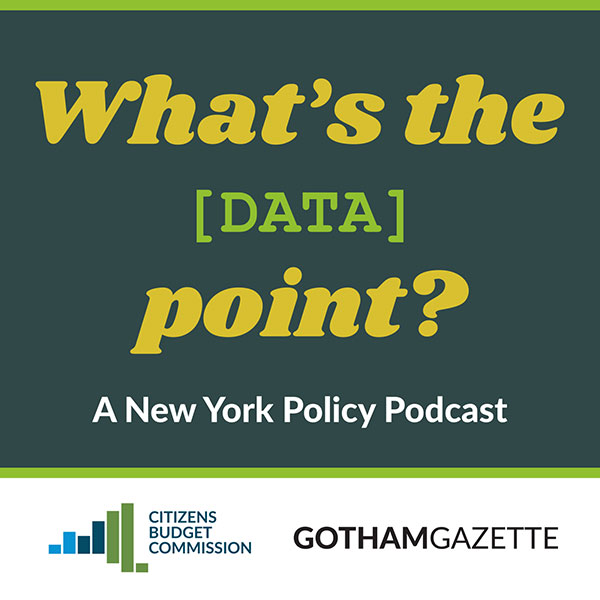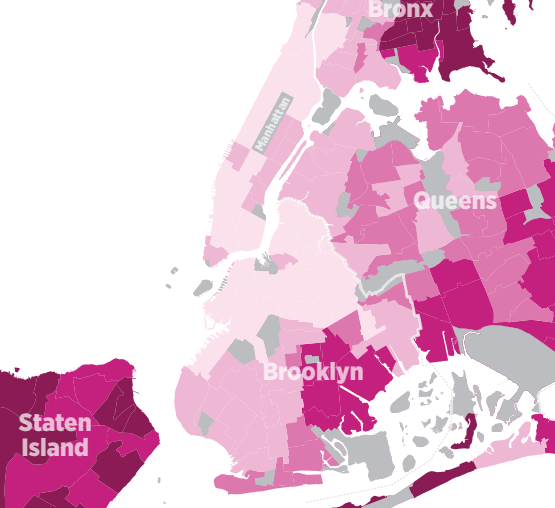Assemblymember Walker, Sponsor of Bail Reform Bill, Optimistic About 2019

Assemblymember Latrice Walker (photo: Kevin Coughlin/Governor's Office)
This is part of AGENDA 2019, a joint Gotham Gazette-City Limits project
Find the rest of the series here
Assemblymember Latrice Walker, a Brooklyn Democrat, has been pushing for criminal justice reform in New York, and believes that 2019 will hold long-sought progress. Among the several pieces of legislation introduced in the Democrat-dominated Assembly that address criminal justice reform, one of the most significant proposals is Walker’s bail reform bill, which passed the Assembly in June but did not move in the Republican-controlled state Senate.
With Democrats having taken the majority in the state Senate through this month’s elections, next year could bring sweeping changes to the criminal justice system in New York, with bail reform atop the priorities for many elected officials, advocates, and others, including Walker, soon-to-be Senate Majority Leader Andrea Stewart-Cousins, and Governor Andrew Cuomo, a Democrat entering his third term. The two legislative majorities and governor will have to work out the details of any reforms, of course, and there are different bail reform proposals.
The need for such reform is evident in Walker’s district, she explains. Representing neighborhoods such as Brownsville and Ocean Hill, Walker, a Brownsville native herself, has seen the current system’s effects first-hand. During a recent appearance on the Max & Murphy show on WBAI radio, Walker explained the “billion-dollar blocks” in her district, which is home to significant poverty, and elsewhere, as areas from which many people have gone to jail or prison, with government spending totaling billions of dollars to detain those people. It’s a way of both pointing out the high costs of mass incarceration and the lack of investment in those same communities for helping people escape poverty and related problems.
Walker believes the current criminal justice system is based around punishing people, and that bail should not be part of that picture, but one area for reform that can then stop feeding the larger problem.
“Bail is supposed to just ensure a person’s return to court. We know that the constitution declares that it’s not supposed to be cruel, unusual, and it’s not supposed to be punishment. And I think that that’s the term that many people forget about New York’s bail system,” Walker said. She’s observed that there has been a rubric of sorts set up in courts where there is more focus on the type of crime allegedly committed, the individual, and the neighborhood in which they live, to determine whether a person is required to post bail.
With her proposal, Walker aims to make the system what it was supposed to be, she says. “It bewilders me when I see attorneys, judges and the like say to me, even across the state of New York, ‘well there has to be some system or something put in place that will ensure that bad people don’t get put back into the streets,’ but that’s not what bail is about, and that’s what I’m here to defend.”
Of course there are certain alleged crimes where the defendant should either have conditions put on their release or not be released at all, argue Walker and others pushing for bail reform, especially major changes or an end to cash bail, but there are many, many others where bail has simply become a punishment of poverty, leading many poor people to spend time in jail for lower-level offenses.
“The bail bill that I introduced allows for an automatic release on a person’s own recognizance in certain situations where their violations, misdemeanors -- other than sex offense misdemeanors, non-violent felonies, and two categories of violent felonies,” Walker explained. A person is not released on their own recognizance if they’ve committed sex offense misdemeanors or most violent felonies. However, the two categories of violent felonies the bill does exempt are burglary or robbery in the second degree, as well as falsely reporting an incident in the second degree.
Walker’s proposal was developed by looking at bail “in the context of speedy trial” and “discovery reform,” she said, which are two other major categories of criminal justice reform Democrats pledge to pursue in Albany next year, where state Senate Republicans had largely disagreed with the bills put forth by Assembly majority and Senate minority Democrats.
The bill would also allow for a defendant to be released on non-monetary conditions but with court-ordered monitoring. Depending on what the court decides, the defendant could be monitored by a pre-trial services agency, the imposition of travel restrictions, and as mentioned by Walker on WBAI, through the use of electronic monitoring systems.
In the cases such as violent felonies, sex offense misdemeanors, and situations where the person released on recognizance or under non-monetary conditions fails to follow through with the conditions of their release, monetary bail can be set. In cases where a person is charged with sex offense felonies, terrorism crimes, class A felonies, witness intimidation, or felonies involving intent to causes injury or death, monetary bail may also be set, though remand without bail (no pre-trial release at all) is also an option.
C ourt-ordered electronic location monitoring would be applicable to defendants when "no other realistic conditions (would) suffice to reasonably assure the defendant's return to court" or when they are charged with a felony, misdemeanor domestic violence, a misdemeanor sex offense, or other crimes outlined in the bill.
ourt-ordered electronic location monitoring would be applicable to defendants when "no other realistic conditions (would) suffice to reasonably assure the defendant's return to court" or when they are charged with a felony, misdemeanor domestic violence, a misdemeanor sex offense, or other crimes outlined in the bill.
Walker recognizes that there are opponents of her plan to her right and her left, and says she’s taken into account the concerns some may have with parts of her proposal. The non-monetary condition situation, as she put it, brings about the question of whether mass incarceration is going to be allowed to be replaced by mass surveillance.
“I wanted to be able to protect that because this new electric monetary system is a new iteration of the billion dollar blocks. Now instead of incarcerating people, you’re got everyone in the ankle bracelets,” said Walker. The widespread use of ankle bracelets is a secondary set-up that Walker said “sets up a system that we’re trying to do away with.”
There have been other versions of bail reform introduced in the Assembly, one of them by Assemblymember Daniel O’Donnell of Manhattan. When asked if there are any significant differences between the two versions of bail reform, Walker highlighted only one.
“In my bill, where a person is still required to be remanded in pre-trial jail, you have discovery reform procedures that kick into play. There is a certain number of time, I believe it’s five days, by which the defense is able to request of the prosecution a discovery evidence or any evidence that might lead to that person being acquitted at the end of a trial,” she explained. This component of her plan gives the person being charged with a crime other mechanisms to “put forth a formidable defense.”
According to the listing of Walker’s bill in the Assembly legislation database, the purpose of the bill is to significantly amend “New York's antiquated cash bail system” for the first in “nearly fifty years.”
“This legislation would move our state toward a more intelligent, individualized system of pre-trial release, monitoring and, when necessary, detention,” the bill states. “The bill is designed to end the current, reflexive overreliance on monetary bail, which each year results in the unnecessary and expensive pre-trial jailing of thousands of persons simply because they cannot afford a modest sum as collateral.”
The Assembly passed Walker’s bill in June as part of a broader criminal justice reform package. O’Donnell’s bill, known as the "bail elimination act of 2018," would fully eliminate the use of cash bail while also ensuring “provisions for pretrial detention,” but has not been voted on in the Assembly.
However, O’Donnell’s bill does have a “same-as” bill in the Senate, whereas Walker’s does not. That may well change come January when the new Legislature begins its work.
Walker said she remains “blindly optimistic,” though she is aware that there are other things that may take priority when the new legislative session begins and Democrats in control of the legislative and executive branches start getting to a long agenda, and that Democrats are not a “monolithic body.”
“I anticipate that bail reform, and criminal justice reform will remain an in-vogue topic,” she said.
[Listen to the full conversation: Assemblymember Latrice Walker on Max & Murphy Nov. 14 2018]
This is part of AGENDA 2019, a joint Gotham Gazette-City Limits project
Find the rest of the series here
***
by Annie Abreu, Gotham Gazette
@GothamGazette
Andrea Stewart-Cousins on Taking the Senate Reins, the Democratic Agenda & Getting Inside 'The Room'

Andrea Stewart-Cousins (photo: Kevin P. Coughlin/Office of Governor Andrew M. Cuomo)
This is part of AGENDA 2019, a joint Gotham Gazette-City Limits project
Find the rest of the series here
After the election results from earlier this month, Andrea Stewart-Cousins is set to become majority leader of the state Senate and, beginning in January, to preside over the chamber as it works with Democrats in charge of the Assembly and Governor Andrew Cuomo, a Democrat headed into his third term, to address a long-delayed liberal agenda. Stewart-Cousins, who represents parts of Westchester, will become the first woman and first woman of color to lead a legislative chamber in New York.
Appearing on the Max & Murphy program on WBAI radio, Stewart-Cousins discussed her approach to leading the Senate, outlined a few priorities for the upcoming session, explained some ways in which Democrats will differ from Republican who have led the upper chamber, and commented on becoming one of three people who will be in “the room,” ultimately making major decisions about the state budget and legislation along with Cuomo and Assembly Speaker Carl Heastie.
When asked, Stewart-Cousins mostly demurred about what issues would be at the top of the Senate agenda, saying that, especially with 15 new members in her roughly 40-member majority conference, senators would first need to meet and discuss how they will approach the upcoming legislative session.
“I have avoided that ‘my first hundred days will look like this’ and ‘this is the batting order,’” Stewart-Cousins said, repeating the terms of the question from one of the hosts. “Because I think the first and foremost thing we’re going to do is [create] the type of conference and senators that people have frankly been voting for again and again and not been getting.”
However, some policies she did mention were those that had already been set as first-order-of-business and seemingly non-controversial among virtually all Democrats: early voting, the Child Victims Act, and the Reproductive Health Act. These are among many policies Stewart-Cousins said “have not been able to move under Republican leadership for so many years” that Democrats plan to get to.
Stewart-Cousins noted that she has faith in the new members of the Senate, some of whom are part of a younger and more progressive movement that successfully claimed many of the seats formerly held by members of the Independent Democratic Conference, a breakaway group that had formed a coalition with the Republicans, at times giving them the seats for a majority. While these new members certainly won’t cut deals with Republicans, they still may not be on the same page with more senior members of the body, perhaps pushing for different, more progressive priorities like single-payer health care.
“We have 15 brand new members and we have to make sure everyone is up to speed,” Stewart-Cousins said. “I am so impressed with every single one of them that I have no doubt that the leadership they will provide, along with my current members, will be absolutely outstanding.”
Stewart-Cousins was also hesitant to name specifics when asked what legislation she sees as being tougher to pass, suggesting with a laugh that there could be conflict about anything and everything.
“I almost want to say all of the above because, you know, we’re Democrats,” she said with a chuckle. “I think everyone agrees on the outcomes we want, it’s just how to get there.”
Stewart-Cousins stressed her belief that Democratic takeover of the Senate is a major step forward for the state, as rather than having to debate over why policies that, for example, raise the minimum wage or ensure access to quality affordable healthcare, are necessary, the new Democrat supermajority will only have to decide on how to best design said policies.
“We’re not starting at convincing people that these things are important,” she said. “Now we’re starting a conversation where we understand [what] the objectives are.”
“Guess what, we’ll have a conference that is willing to acknowledge climate change and therefore, work towards ensuring our planet’s future,” she continued.
 While expectations are high about addressing climate change, criminal justice reform, gun control, voting and campaign finance reform, tightening rent regulations, and more, there have been concerns that if Democrats were to flip the Senate and full control of state government that taxes would go up in order for the new regime to pay for all its new programs. But, during the campaign and since, Stewart-Cousins and others in her incoming majority have said they have no plans to raise taxes, an approach in line with Cuomo’s, but not necessarily Assembly Democrats.
While expectations are high about addressing climate change, criminal justice reform, gun control, voting and campaign finance reform, tightening rent regulations, and more, there have been concerns that if Democrats were to flip the Senate and full control of state government that taxes would go up in order for the new regime to pay for all its new programs. But, during the campaign and since, Stewart-Cousins and others in her incoming majority have said they have no plans to raise taxes, an approach in line with Cuomo’s, but not necessarily Assembly Democrats.
Asked on Max & Murphy if she is indeed committed to not raising taxes, Stewart-Cousins reiterated her stance, and pointed to the federal tax reforms passed in late 2017 that are likely to negatively affect many New Yorkers due to the new cap and local and state deductions from federal tax obligations.
“We are not coming in there to raise people’s taxes,” Stewart-Cousins said. “We understand that New York is a big state and we understand that we need to make sure that it is affordable. I’m personally concerned about the impact of this federal tax bill on the New York taxpayers, and I think most people in our position are.”
Taxpayers will find out if Democrats stay true to their promise in their first big test: the next state budget, which Stewart-Cousins and her conference will have significant influence on, as the new Senate majority leader negotiates with Cuomo and Heastie. As the first woman to lead a legislative majority, she will be entering that negotiating room that has been male-dominated. When asked what that may mean, Stewart-Cousins said it shows progress made and more to do.
“I think it means that people see that once again another glass ceiling, marble ceiling, whatever you want to call it, has been broken,” she said. “We make certain assumptions about how far we’ve come, and we have in many ways, but I think everyday we’re also being reminded that there is more ground that has to be covered more ceilings to break.”
When asked if she has any plans on how to change the backroom process that often leads to major budget and legislative agreements that are voted on with virtually no public review, Stewart-Cousins said she couldn’t yet say.
“It’d be impossible to say, because I’ve never been in it,” she said, pausing to laugh. “I’m interested to see how this thing really works as well. I’m sure I’ll have a lot of opinions once I’ve actually been part of it.”
When it comes to those outside the Democratic conference, Stewart-Cousins said that she has not spoken to any Republicans who want to switch conferences, but would be happy to meet with Senator Simcha Felder, a Democrat who previously gave Republicans a one-seat majority in the Senate, about his role in the upcoming session. She said Felder had reached out and they would set something up, though he is not expected to command any special perks as he had from Republicans for helping give them the majority.
Of the former IDC members who kept their seats, Senators Diane Savino and David Carlucci, Stewart-Cousins said they have been and continue to be part of the Democratic conference, which they returned to in an April deal reached by Governor Andrew Cuomo.
[Listen to the full conversation: Soon-to-be Senate Majority Leader Andrea Stewart-Cousins on Max & Murphy Nov. 14, 2018]
This is part of AGENDA 2019, a joint Gotham Gazette-City Limits project
Find the rest of the series here
***
by Victor Porcelli, Gotham Gazette
@GothamGazette
What's the [DATA] Point? 1981, New York's Property Tax System

What's The [Data] Point? Episode 59 - 1981 [You can download What's The [Data] Point? wherever you get your podcasts, including on iTunes]

The data point for today is 1981, the year in which the State Legislature enacted S7000A, the landmark bill that formalized the current property tax system for New York City. A response to the Hellerstein case, which found the system was in violation of State law, S7000A essentially codified the status quo.
In doing so, it established a system of property classification, fractional assessments, caps, phase-ins, and class shares that is still with us 37 years later. These structural features and statutory requirements are the root of the system’s inequities and complexities. A home worth $500,000 can face the same tax bill as a home worth $1.5 million, while the value of a condominium unit, according to the City, is a fraction of its sale price. In fact, some buildings have values that are below the sale price of individual units. And commercial and rental property faces a higher average property tax burden than 1-, 2- and 3-family homes.
These inequities and problems have led to repeated calls for reform, including pending litigation. This past May, Mayor de Blasio and Speaker Johnson formed the Advisory Commission on Property Tax Reform. In September, the Citizens Budget Commission, the Regional Plan Association, and NYC Robert Wagner School of Public Service held a panel to discuss the problem, inequities and potential reforms
Listen to the conversation and let us know what you think: Ben Max of GG (@TweetBenMax), Maria Doulis of CBC (@MariaDoulis). Listen below or download wherever you get your podcasts!
***
by Ben Max, Gotham Gazette
@tweetBenMax @GothamGazette




